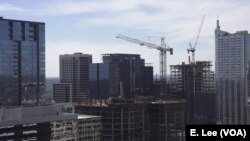When a Silicon Valley company in northern California asked Sumat Lam to transfer to Austin, Texas, common stereotypes came to mind.
“I definitely was confused when I was offered the role out of college for Austin. You think about cowboys. You think a little bit about the barbecue. Everything is bigger in Texas,” Lam, a Cambodian-American, recalled.
Texas could have seemed like another country for Lam, who grew up in California as the son of immigrant parents. He is from the Greater San Francisco Bay Area and went to Stanford University, in the Silicon Valley technology corridor. His friends encouraged him to give Austin a try. He moved and has been working in Austin for the last four years.
WATCH: Why is Austin an Attractive Hub for Many Tech Companies?
“I definitely love Austin more after four years here. I was really taken aback by how small it was. I was expecting a much larger metropolitan area, but me, I actually love the size of Austin.
“It’s not as embedded in the Texas stereotype as people presume,” Lam said. “People from all over are coming, people are bringing in the culture, their influences from Boston and New York and Philadelphia.”
Characteristics of a tech hub
While Austin is not Silicon Valley, technology companies from that area and other major U.S. hubs are taking notice of Austin’s growing tech scene. The lower cost of living and doing business, combined with a smaller size, are among the reasons that people and companies are attracted to Austin.
“I look at all the companies that have already moved here or in the process of moving here. Google, Apple, two of the big leaders in the tech already have large offices down here,” Lam said.
“I’ve heard people call it Silicon Ranch. I think it’s kind of hilarious,” said Austin native Meghan Berry, who also works for a tech company.
Start-ups and big companies are taking up office spaces downtown and more are being built.
Offices influenced by Silicon Valley tech culture, featuring ping pong tables, catered meals and massage therapists, can be found in Austin. Lam also noticed the area’s transient culture.
“I’ve come to realize it’s such a transient place. People tell me they do a few years at a given tech company and look for the next role at another company,” he said.
What fuels Austin’s tech industry?
Many Texans consider the Austin-based computer company Dell, as the flagship firm that gave birth to an entire tech ecosystem in the city.
“There was a thing called “Dellionaires,” and so people who became millionaires after they worked at Dell, then went out and they started a bunch of companies,” said Chris Valentine, event manager and producer for a technology event called the SXSW Accelerator Pitch Event.
The University of Texas, plus the annual SXSW (South by Southwest) technology conference and music festival increase the city’s tech presence on the map by attracting tech experts and entrepreneurs from around the globe. People in the music business also fuel the tech industry in Austin.
“A lot of my friends are musicians. They also work in the tech field so there’s a huge overlap,” Berry said.
“There’s a strong foundational tech base that’s here. There’s that creative aspect and really bringing that all together is a powerful combination,” said Lou Kikos, general manager of Los Angeles-based web hosting provider Media Temple. The company has had a presence at SXSW in Austin for the past 11 years.
“A lot of companies are coming here. They have access to capital; it’s a very open community. That’s one of the wonderful things about Austin; people just seem to be kind of very open, kind of wanting to help each other,” Valentine said.
Culturally, Lam said that while Austin is home to people from Latin America and Europe, there are not that many people who look like him in town.
“When I walk out on the street, let’s just say I’m more than likely to be one of the only minorities, sort of, on any given street or any given room,” he said.
While Lam misses Cambodian food, he would recommend Austin to anyone who wants to relocate because the standard of living is high, and Austin has all the benefits of a big city without being too big. Another perk, Lam said, is the people.
“I’ve never felt unwelcome here,” he said.










